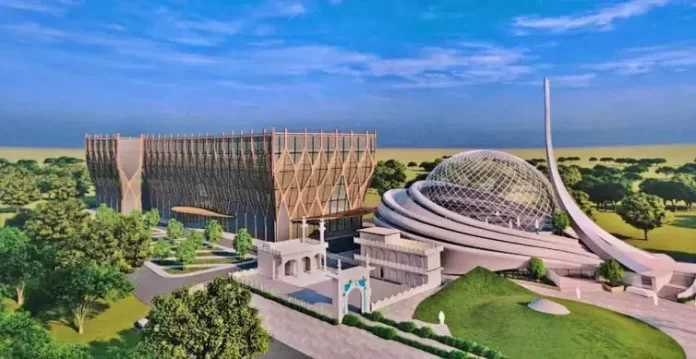The construction of a mosque in Ayodhya is expected to begin after the holy month of Ramzan. In a recent board meeting, the Ayodhya Development Authority (ADA) approved the mosque complex layout in Dhannipur village.
Nitish Kumar, district magistrate and chairman of ADA, Ayodhya, said, “All pending clearances to Ayodhya’s mosque cum complex project have been cleared in the recent board meeting. The sanctioned layout of the mosque will be handed over to the Sunni Central Waqf Board (SCWB) in the next couple of days after completing a few formalities.”
The SCWB termed the development a big move and stated that it will convene a meeting in this regard, most likely after Ramzan.
Athar Hussain, secretary Indo Islamic Cultural Foundation (IICF) – the trust formed by SCWB to look after the construction in Dhannipur-said, “We will convene a meeting after Ramzan where we will finalise the plan to start construction. In the same meeting, we will also chalk out the final date to begin construction of the mosque complex.”
The holy month of Ramzan is expected to begin on March 22 and end on April 21.
On November 9, 2019, the Supreme Court’s Constitution Bench approved the construction of a temple in Ayodhya at the site where the 16th Century Babri Masjid once stood and was brought down by ‘Kar Sevaks’.
In the same decision, the Apex Court had also asked the government to allot a “prominent and suitable” five-acre plot in Ayodhya for the construction of a mosque in lieu of the Babri Masjid.
While the board’s clearance has paved the way for the mosque’s construction, the SCWB has stated that it does not want to associate the upcoming mosque with the disputed 16th Century structure that was brought down on December 6, 1992.
As a result, they stated, it would not be named after any Mughal emperor.
Athar Hussain said the mosque cum complex will be named after the freedom fighter and revolutionary Maulvi Ahmadullah Shah Faizabadi. It will include a mosque, hospital, community kitchen, and museum among others.
“The maximum area would be allocated to the hospital. We plan to develop a multi-specialty hospital that would be equipped with state-of-art facilities. The entire hospital will be established in two phases. In the first phase, arrangements for 100 beds would be made while in the second phase, 100 more beds will be added. The hospital will offer the best treatment in cancer care, transplants, spine, heart, robotics, orthopaedics, emergency and others,” he added.
The trust has appointed Professor S.M. Akhtar, a Lucknow-based architect-cum-town planner and founder dean, faculty of architecture, Jamia Millia Islamia University, Delhi, to design the mosque.
Along with this, the trust has also appointed renowned historian, international relations expert and chronicler of Indian cuisine Professor Pushpesh Pant as consultant curator of its archival museum that would be a part of the mosque complex.
A multi-story vertical structure will house the specialty hospital, community kitchen, and museum. These will be meters away from the mosque and a century-old Sufi shrine will be in between.
Meanwhile, the mosque will be spherical in shape, with a capacity to accommodate 2,000 ‘namazis’ or worshippers at a time. It will be four-times bigger than the Babri Masjid.
The hospital complex will be six-times the size of the mosque. The mosque will be constructed on 3,500 square meters of land while the hospital and other facilities will straddle an area of 24,150 square meters.
The building will be zero-energy to convey a message on climate change. All power demands in the mosque will be met with the help of solar panels and there will be no electricity connection.
A green patch will be created, and saplings will be collected from all over the world, including the Amazon rainforest, places where the bushfire took place in Australia and other geographical locations in India.
There is currently no detailed plan in place to collect contributions for the project. Two separate bank accounts have been created to collect money for the construction – the first for the mosque and the second for other structures.
(This story has been sourced from a third-party syndicated feed, agencies. Raavi Media accepts no responsibility or liability for the text’s dependability, trustworthiness, reliability, and data. Raavi Media management/ythisnews.com reserves the sole right to alter, delete or remove (without notice) the content at its absolute discretion for any reason whatsoever.)







